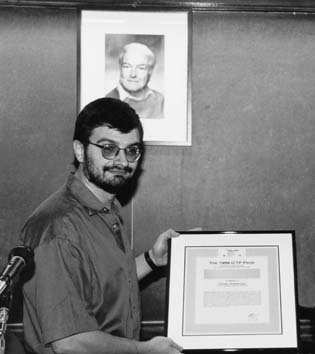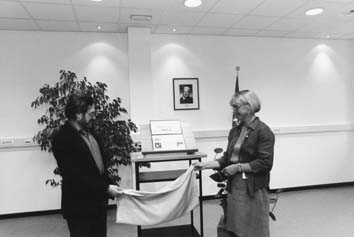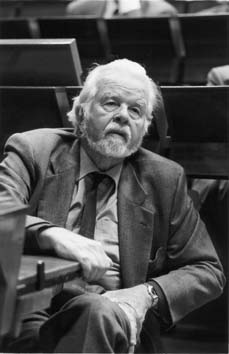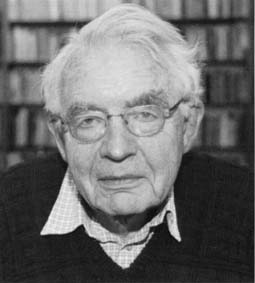Personal tools
News from ICTP 94 - Monitor


Daniel Domínguez, professor of physics at Instituto Balseiro in Bariloche, Argentina, officially received the 1999 ICTP Prize on 21 July. Domínguez was honoured for his studies of vortex dynamics in superconducting materials and Josephson junction arrays. The 1999 ICTP Prize in the field of condensed matter theory is named in honour of Stig Lundqvist. At a ceremony held on 21 July, ICTP officially opened the Lundqvist Lecture Hall. The ceremony included brief presentations by ICTP Director Miguel Virasoro and Stig Lundqvist's elder daughter.

Nine members of the Lundqvist family, including his sister,
children and grandchildren, joined Stig's colleagues and friends
to honour the memory of one of the Centre's most important figures.
Lundqvist, who served as the head of ICTP's Scientific Council
from 1983 to 1992, was the driving force behind the creation of
the Centre's condensed matter group. He died on 6 April following
a long illness. For personal commentaries on Stig Lundqvist's
life and career, click
here.

Paolo Budinich, instrumental in the creation of ICTP and for many years its deputy director, tells his story in an autobiography titled L'arcipelago delle meraviglie (The Archipelago of Wonders), published by Di Renzo Editore in Rome, Italy. Apart from his personal remembrances (Budinich was born in 1916 in Dalmatia, then part of the Austrian-Hungarian Empire), the book recounts the political battle leading to the creation of ICTP in Trieste as well as the early days of the Centre. In the concluding pages, Budinich writes about the reconciliation between science and philosophy and the capacity of mathematics to anticipate unknown physical realities-from antimatter to string theory.
Retirements and Refurbishments
The bar in the ICTP Main Building has been refurbished and a new
'bar man', Antonio Cefalù, has taken over responsibility
for the facility from Erasmo Iannello, who retired in July.
Other recent ICTP retirees include conference clerk Patricia
Sessi and maintenance worker Roberto Leibelt. All were
honoured at a party on 6 July. ICTP scientists and staff extend
them all good wishes for an enjoyable retirement.
IAEA DDG
Werner Burkart has been appointed the new deputy director
general, head of the Department of Nuclear Sciences and Applications,
at the International Atomic Energy Agency (IAEA) in Vienna, Austria.
Burkart replaces Sueo Machi, who had served in that capacity
since 1991. Born in Olten, Switzerland, but now a German national,
Burkart studied biochemistry and microbiology at the Swiss Federal
Institute of Technology in Zurich, where he earned a Ph.D. in
biochemistry. For the past decade, Burkart has worked in the German
Federal Office for Radiation Protection in Munich and Freiburg.
Earlier in his career, Burkart held posts with the Swiss National
Science Foundation, the Swiss Institute for Reactor Research,
the Marine Biological Laboratory at Woods Hole, USA, and the Paul
Scherrer Institute in Switzerland.
Hendrik B.G. Casimir 1909-2000

Hendrik Brugt Gerhard Casimir, a Dutch theoretical physicist equally
at ease in academic classrooms as he was in corporate boardrooms,
died on 4 May at the age of 91. Casimir, who served as president
of the first ICTP 'ad hoc' committee in the early 1970s, was a
strong supporter of the Centre since its inception. His wide-ranging
career included important contributions to the theory of superconductivity.
He predicted the so-called Casimir effect-a universal attractive
force that occurs between two conducting metal plates when they
are placed an extremely short distance apart. He also gave his
name to the Casimir operator in quantum mechanics. Born in The
Hague, The Netherlands, Casimir worked in Copenhagen, Denmark,
with Niels Bohr, and in Zurich, Switzerland, with Wolfgang Pauli,
both Nobel Prize winners. In 1942, during the German occupation
of the Netherlands, he moved to the Philips Research Laboratories
in Eindhoven, becoming one of the three research directors just
after the war. He remained at Philips for the remainder of his
career, retiring in 1972 to become professor emeritus at Leiden
University. He was also the first president of the European Physical
Society. His autobiography (Haphazard Reality) was published in
1983. Casimir was a frequent visitor to ICTP, attending several
conferences on physics for development. His final visit took place
in 1993.